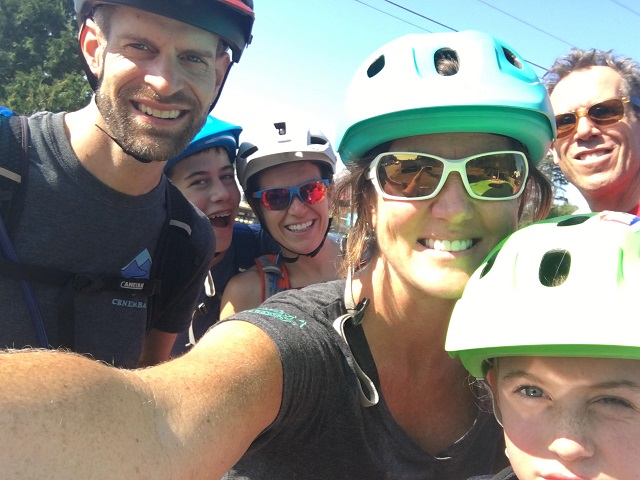Why does change feel like a threat to our very existence—and how do we manage when the sh*t hits the fan?
Sometimes life is hard.
For many of us, it can be the suffering we feel when things change; we get lost when life takes a turn we weren’t prepared for. We are animals, after all, wired for survival. It can be a long, dark night of the soul for some of us as we try to find our way back to our better selves. We have choices; the practices of mindfulness, self-awareness, and vulnerability help us toward right thinking and a first step into right action.
“Stress is a response to a perception of threat.” ~ Gabor Mate
The Holmes and Rahe Stress Scale measures life’s major events and assigns a grade to each, ranging from high to low, in an attempt to quantify the impact. The list includes, but is not limited to: death of a loved one, divorce, illness, having children, moving, switching jobs or schools, and more. Stress can be defined as tension, pressure, or strain—and the correlation between stress and our health has been widely researched and documented. We know this. Google it.
Our response to stress is as varied as the stressors themselves, but one thing we can all relate to is that stress is uncomfortable and we’d like relief from it. My initial response to my divorce (and the sh*t-show that went along with it) was to check out. I abandoned my marriage and a lot of good things in my life. The shame of failure was isolating, and I was scared and embarrassed to be in my own skin.
The thing is I didn’t stay there—and why not? Because all things change? I think there’s more to it.
When we are struggling, we can disappear in that struggle—in that stress response. For me, getting present with the current moment was key. I created space in my life for clarity. In my case, it meant moving into a new house, which provided boundaries and space. I started a writing practice and a sitting practice, giving myself time to gain presence and reflect. Mindfulness and self-awareness led to therapy and cleaning up my self-care, but there was still something lingering: shame.
There were people and places I stayed away from—things I thought lost in the divorce. Mountain biking was one of them. My love of the sport was tied up so deeply in my marriage, from the ease of having perfectly maintained gear, to the choice of the trail, to the constant riding and training partner I had in my husband. He proposed on a ride, the ring hidden in my granola.
Supporting each other through training and events, we grew stronger together on bikes. Our babies rode in a trailer pulled behind us, or we left them with a sitter for our weekly date night—which was a ride. We rode together for hundreds of miles, in all kinds of weather, mostly happy. It wasn’t perfect, but we were strong there, and we always had it.
Until we didn’t.
And while I was overwrought with regrets—guilt, finding space, gaining clarity, going to therapy, raising kids, and freaking out—my ex-husband was getting on with his life in his own way. He was still riding. He eventually met someone new—and when he bought her a mountain bike, I was annoyed. When it became a regular activity for my children to go on rides with them, I was seething. Younger than me by years, more fit, and less damaged, this new woman was taking my place.
Yet, she was calling me forward.
It was a Sunday; the kids were transferring from my house to their house. They were all going to go for a ride.
“You could join us,” said their dad.
This is where my story changed—I had a choice. My gear was old, I was out of shape, and my clothes were out of date. I had stayed away from the mountain, the people, and the sport I loved, because I was embarrassed. I was not what I had once been. When we stay in hiding because we are ashamed, it can be isolating. The very thing that keeps us from connecting is the one thing that can get us back into connection.
What do we do when life invites us on a ride?
I got back on my bike. Humble and happy to ride in the back of the pack, the trail was the great equalizer. In the woods, with my family on bikes, I was reminded of my best self. I was patient with the kids and their fussing—mountain biking is hard—and overfilled with joy to watch them roll down hills with ease. I basked in the ease and competence of their father, as he led us all safely, skillfully, and with a sense of humor. I found my strength and grace as I supported and encouraged his partner in trying new things and in her successes—mountain biking is hard.
Saying yes to my love of mountain biking and the relationships and community I built around the sport was my right action. It has healed my relationship with myself and my family. When we are on the trails, we are our best selves working together, taking care of each other, and supporting each other.
This helps us off the trails when we are navigating the winding roads of a blended family and reminds us to always have each other’s backs. Our unique skills, when combined, have created countless opportunities to serve others. We regularly work together to coach, mentor, build trails, and advocate for the sport. This helps us give back to the community and spend some valuable family time together making a difference in our world.
When we’re able to see ourselves with love, we are able to see others in the same way. Life—like mountain biking—is full of challenge. We can view these as obstacles or opportunities. When we take the time for presence and reflection, we may see life’s inevitable change as sacred invitations to be the finest version of ourselves.
Often times, this involves courage, deep courage. There is hope on the other side of despair—and when we can be brave enough to say yes, the possibilities are limitless.
If you could say yes to anything—what would it be?
~
Relephant:
9 Brilliant Life Analogies Mountain Biking Taught Me.
~
Author: Leah Gartner
Image: Author’s own
Editor: Yoli Ramazzina
Copy editor: Lieselle Davidson







Read 1 comment and reply